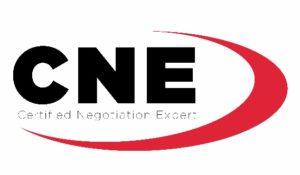“Let us never negotiate out of fear. But let us never fear to negotiate.” – John F. Kennedy
Owners still hold a lot of the cards when it comes to selling a home to buyers, especially in an area such as Seattle/King County where multiple offers still can occur and limited inventory persists.
Sometimes, an agent’s negotiation skills can be the difference between winning the bid on a home – or not.
“It’s important to have a Realtor ® who knows what they are doing,” said Ed Brodow, author of Negotiation Boot Camp: How to Resolve Conflict, Satisfy Customers, and Make Better Deals. “Negotiators are like detectives,” he said. “You have to ask a lot of questions and be persistent.”
 Among the two million or so real estate agents in the U.S., only about 3.5% are Certified Negotiation Experts ®, or CNEs, from the Real Estate Negotiation Institute (RENI). I felt it was important to my reputation and for my clients’ confidence in me that I completed the studies and passed a moderated exam to get my certification. Yes, I am proud to be one of the 3.5%.
Among the two million or so real estate agents in the U.S., only about 3.5% are Certified Negotiation Experts ®, or CNEs, from the Real Estate Negotiation Institute (RENI). I felt it was important to my reputation and for my clients’ confidence in me that I completed the studies and passed a moderated exam to get my certification. Yes, I am proud to be one of the 3.5%.
Buyers are putting their faith and hope around the biggest purchase of their life with a broker who should not only be a trusted advisor but also one that is equipped to skillfully negotiate on their behalf. According to RENI, a full 99% of buyers believe negotiation skills are “very important” or “somewhat important” in their real estate professional, but only 35% of those buyers felt their agent “negotiated a better price.”
If selected as your real estate agent, I will negotiate throughout the process on your behalf – whether buyer or seller. The effort begins by learning from clients their needs and objectives (priorities, timelines, bottom lines and much more) in the purchase or sale of the home. I will always have your best interests in mind.
When negotiating with another agent, I typically bring a collaborative and positive approach to the table. I listen to their concerns and priorities. I want to understand what they expect from the purchase and sale – other than buying and selling the physical property. Agents and their clients want to be heard.
By taking that approach, you often receive respect and establish trust from the other side of the transaction. After all, people are more willing to do things for you when you value and trust them.
This collaborative style of negotiation generally works well – particular in the Pacific Northwest, where it’s less combative and a less emotional discussion. (If you lived on the East Coast, you know what I’m talking about!) Home buying and selling is already a stressful situation, so who needs more?!
Competitive negotiation – characterized by intimidation and being fixated on one’s own positions – can often lead to only a single winner. Collaborative negotiation – often featured by power- and information-sharing – can lead to two winners.
It’s amazing, too, how negotiations can be more successful when it’s conducted in person – two agents seeking to build mutual understanding of both parties’ position. Forget texting or even phone calls when a face-to-face discussion is often the smoothest path to success.
To be sure, we are not out to make friends or show our cards in this situation. The aim is still to meet the goals and objectives of my client before establishing the desired outcomes of the other party. This often works, builds integrity between agents and their firms and – most importantly – effectively delivers results for your clients.
Without a clear picture of what both sides need and want to accomplish a deal, an unskilled agent could make poor assumptions and put the client in a weak negotiation position. Not all people want juice from an orange; some want the rind for marmalade. Know both positions!
Research at MarketWatch Centre for Negotiation found that negotiators can claim up to 42% more value in a deal by creating a relationship based on trust and collaboration. Imagine that – people seeking collaboration!
Isn’t that what you want from your real estate broker?
Selecting your real estate professional is no different than buying a diamond. Quality matters.




